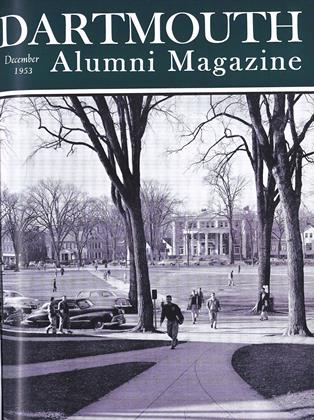Fred Lewis Pattee'88. State College, Pa.: PennsylvaniaState College, 1953. $4.75.
Professor Pattee was born in Bristol, New Hampshire, on March 22, 1863, and died on May 6, 1950, at Winter Park, Florida. As he requested, his body was brought back to Bristol to lie forever amidst the New Hampshire hills he never ceased to love.
In spite of the fact that he wrote many books and taught for more than sixty years winter and summer at Penn State, Illinois, and Rollins, his monetary reward was so little that during his last illness a collection had to be taken up for him to help pay his hospital bills. So does this rich country reward its teachers. So does life treat one who was always, as he once wrote, "a dreamer, always a peerer beyond far horizons." It is gratifying to know that the Library at Penn State has been named after him.
The Pattees were workers, peasant-minded so far as adherence to the land was concerned, practical in the extreme, and never a moment idle. His father, though he lived but fifty miles away, never saw the White Mountains. The attitude of his family toward the domains of art and beauty and literature was Puritanic. They were Methodists and their religion was emotional; and the emphasis was placed always on the "Heavenly Home." As Dr. Pattee almost ruefully states: "The Church was central in New England's thinking."
It was this reviewer's privilege to study with Dr. Pattee one year at Penn State. He remembers him there, in Bristol on his farm, and in Hanover, as a serious, deeply religious, and thoroughly delightful man. His autobiography is not a gay book, but is, in fact, rather grave in tone, and perhaps with justice might be called a sad book. His New England conscience, his Puritanical upbringing, never ceased to weigh on him.
He writes: "Masefield, the poet laureate, once wrote, 'the things not touched with joy drop out of memory,' and thereby demonstrated that he does not possess a New England conscience. I do possess one and it has added no comfort to my old age. ... More and more as old age creeps on I am conscious of mistakes I made in earlier years and deeds I should have done and did not do. I often find myself brooding on these.... In my case it was inherited and certainly it is incurable."
He had lived, he wrote, "to see the virtual break-up of all in New England that once I considered fundamental." "Am I to live," he continues, "to see a universal American break-up with some Hitler-like theology displacing the Puritanism taught me in my childhood and a dictator code displacing the Constitution? It disturbs my sleep at night." It disturbs the sleep of other thoughtful men, too.
For Dartmouth men his chapters on Dartmouth will perhaps be the most interesting. Pattee borrowed all of $25 to come to college. As a scholarship boy he had to sign the pledge: "I hereby deliberately declare and affirm that during the present academic year at Dartmouth College I will on no occasion make use of tobacco or of intoxicating drinks." The Dartmouth of his day was run single-handed by President Bartlett, "passing on student credentials, and admitting freshmen without a secretary, typewriter, or college dean, the latter office not even a dream at Dartmouth at that time (1884). Bartlett was not only President, but he was the whole administration. He wrote all letters by hand, attended personally to all matters of excuse from duty and all cases of discipline." This is a far cry from today, and who can say with any certainty that our education is any better now than it was then?
Lack of space forbids further comment. I can only say that I was delighted to read the story of my old teacher and good friend, and though I cannot say that I am happier for the experience, I am certainly wiser.
 View Full Issue
View Full Issue
More From This Issue
-
 Article
ArticleBIGNESS
December 1953 By DAVID E. LILIENTHAL -
 Article
ArticleCharles Ransom Miller '72
December 1953 By JOHN HURD '21 -
 Class Notes
Class Notes1918
December 1953 By ERNEST H. EARLEY, w. CURTIS GLOVER, RICHARD P. WHITE -
 Class Notes
Class Notes1935
December 1953 By HENRY R. BANKART, JOHN WALLACE -
 Class Notes
Class Notes1931
December 1953 By Lambert & Feasley, Inc., PETER B. EVANS, CHARLES S. MCALLISTER -
 Article
ArticleA True Dog Story
December 1953 By A. I. Dickerson
Herbert F. West '22
-
 Article
ArticleHANOVER BROWSING
June 1936 By Herbert F. West '22 -
 Article
ArticleSuggestions
April 1940 By HERBERT F. WEST '22 -
 Article
ArticleHanover Browsing
November 1941 By HERBERT F. WEST '22 -
 Article
ArticleHanover Browsing
August 1942 By HERBERT F. WEST '22 -
 Article
ArticleHanover Browsing
January 1952 By HERBERT F. WEST '22 -
 Article
ArticleHanover Browsing
May 1955 By HERBERT F. WEST '22
Books
-
 Books
BooksTHE LITERARY ART OF EDWARD GIBBON.
June 1960 By ARTHUR M. WILSON -
 Books
BooksThe Real Turk
May 1915 By C. H. H. -
 Books
BooksBROTHERHOOD OF MEN
July 1949 By F. Cudworth Flint -
 Books
BooksTHE COMPLETE STAYMAN SYSTEM OF CONTRACT BIDDING
May 1956 By FREDERICK PIERCE '01 -
 Books
BooksTHE AMERICAN CAMPAIGNS OF ROCHAMBEAU'S ARMY 1780, 1781, 1782, 1783. Vol. 1. THE JOURNALS OF CLERMONT-CREVECOEUR, VERGER, AND BERTHIER. Vol. 2. ITINERARIES AND MAPS AND VIEWS.
MARCH 1973 By Louis Morton -
 Books
BooksTHE ORAL NATURE OF THE HOMERIC SIMILE.
October 1974 By RICHMOND LATTIMORE'26

